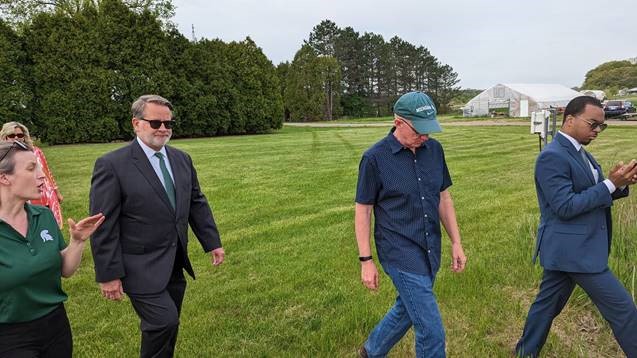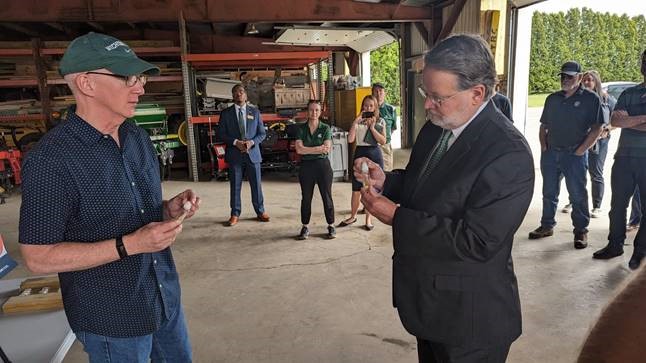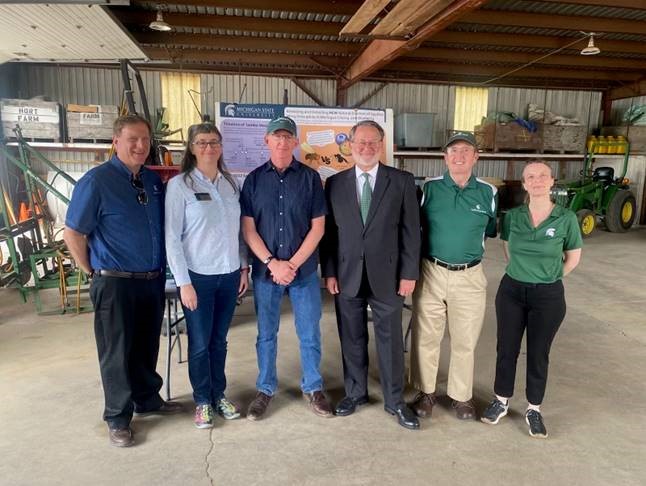PHOTOS: Peters Visits MSU Horticulture Center to Highlight Need to Pass His Bipartisan SWAT Act to Address Invasive Fly Hurting Michigan Fruit Growers
Peters Pushing for Inclusion of Bill in Upcoming Farm Bill; Would Fund Mitigation Efforts and Advance Research on Spotted Wing Drosophila (SWD) Which Continues to Threaten Blueberry, Cherry, and Other Fruit Crops
HOLT, MI – U.S. Senator Gary Peters (MI) visited Michigan State University’s (MSU) Horticulture Teaching and Research Center to highlight the need to pass his bipartisan SWAT Act, which would help reduce the spread of spotted wing drosophila (SWD). SWD is an invasive insect that continues to hurt growers in Michigan and across the country by laying their eggs in soft-skinned fruit crops such as cherries and blueberries, making entire crop loads unsellable. Peters’ Spotted Wing Abatement Trust (SWAT) Act would establish a fund managed by the U.S. Department of Agriculture (USDA) to strengthen efforts that mitigate the spread of this invasive pest, helping to keep costs down for growers and prevent their crops from being spoiled in the first place. Peters is pushing for the bill to be included in the 2023 Farm Bill.
“I’ve heard from growers across Michigan about how this invasive fly continues to damage their crops and make them unsellable to buyers, harming their livelihoods,” said Senator Peters. “Seeing the work at Michigan State University firsthand reinforced that we have an opportunity to leverage their research and pest management strategies to help growers in our state and across the country. To do that, we need to pass my bipartisan bill that would help protect crops and lower costs for farmers, who are having to take matters into their own hands to combat this pest.”
“It’s clear that more federal resources are needed to both improve our understanding of these invasive pests and provide farmers with effective tools to address infestations,” said Michigan State University Professor of Entomology Rufus Isaacs. “That’s exactly what Senator Peters’ SWAT Act would do and why I have worked hand-in-hand with Senator Peters on this bipartisan legislation to invest in advancing research, like the work we’re spearheading here at MSU, and pest management strategies. The SWAT Act will move us closer to resolving this growing problem.”
“Michigan’s agricultural sector at-large – and particularly soft-skinned fruits like blueberries – are so important to our overall economy and producers throughout the region. But our Commission continues to hear from growers all across our state that these invasive pests are putting their livelihoods in jeopardy by rendering entire crop loads unsellable,” said Executive Director of the Michigan Blueberry Commission Nancy Nyquist. “It’s imperative that we protect this economic engine and the ability of farmers to do their jobs. Senator Peters’ bipartisan SWAT Act will help to address this issue by ensuring we’re both prepared and equipped to reduce the population of SWD.”
During the visit, Peters met with local blueberry farmers and toured MSU’s Horticulture Teaching and Research Center – which plays a leading role in advancing national research on- and developing effective pest management strategies for SWD. Peters also examined the Center’s ongoing SWD mitigation efforts including the samba wasp – a natural predator to SWD.
To download photos from the visit, click here or on the images below. Images are courtesy of Senator Peters’ office.




The spotted wing drosophila (SWD), which originates from East Asia, lays eggs in soft-skinned fruit crops, including cherries, blueberries, raspberries, blackberries, and strawberries. Since their first detection in the continental United States in 2008, they have spread across the West Coast, as well as through Florida, Utah, the Carolinas, Wisconsin, and Michigan. The spotted wing drosophila have caused more than an estimated $700 million in economic loss per year nationally – in part because fruit buyers have a zero tolerance policy if the invasive insect is spotted on crops, meaning entire crop loads can be rejected if a single larva is detected. In addition, the use of insecticide and other pest management strategies on these crops in the U.S. has increased, raising costs for farmers.
Peters reintroduced his Spotted Wing Abatement Trust (SWAT) Act with U.S. Senators Susan Collins (R-ME), Mike Braun (R-IN), and Jeff Merkley (D-OR) to establish a fund managed by the U.S. Department of Agriculture’s Animal and Plant Health Inspection Service to advance research and strengthen efforts to reduce the species’ population in the U.S. The fund would be authorized at $6.5 million annually for five years.
Peters has previously fought to support growers in Michigan and across the country by strengthening our defenses against invasive species. In 2020, Peters’ bipartisan legislation to address the shortage of agricultural inspectors who protect the nation’s food supply and agricultural industry at the border was signed into law. Peters also has led the charge to level the playing field with his bipartisan Self Initiation Trade Enforcement Act to help small- and medium-sized businesses negatively impacted by unfair trade practices from foreign countries, including Michigan cherry growers hurt by dumping and subsidies on imported goods. Peters has raised this issue with President Biden, Biden Administration officials, and the previous Administration. After a push by Peters, the U.S. International Trade Commission announced it would start tracking foreign imports to accurately measure the impact of trade on Michigan’s tart cherry industry.
###